Google AdWords (Google Ads) is one of the most popular online advertising platforms for Realtors in 2022.
It takes months, in some cases years, to rank high in organic search results for competitive keywords, but your brand can secure the Number #1 position within minutes if you are willing to spend money on Google Ads.
While Google Ads can get you high-converting real estate leads for sure, it can also end up being a money pit if you don’t know how to set up fully optimized Google Ads pay-per-click (PPC) ads for real estate leads.
Not creating an optimized conversion funnel before running an ads campaign is one of the biggest mistakes real estate agents and brokers make. They drive leads to the homepage of their websites where there is no call-to-action or any other mechanism to capture leads. These pages leave visitors in utter confusion as to what they are supposed to do next.
Here is the rule you must follow: You must some profit for every ad campaign you run. If you have spent $500 on Google ads without generating at least 20 leads, then it’s quite obvious that you are not using this advertising platform the right way. It means you need to take a hard look at your advertising strategy, instead of cursing the platform and giving up.
In this guide, I am going to explain in detail how Google Ads works and share some of the best Realty Crux guides on the topic.
Table of Contents
Preparations to make before launching a real estate Google Ads campaign
Before you launch a campaign, make sure that you’ve made the following preparations:
Structure your account the right way
Determining how you will organize your account is one of the most important things to do to set yourself up for success.
You need to make sure that you categorize your real estate services properly at campaign and ad group levels.
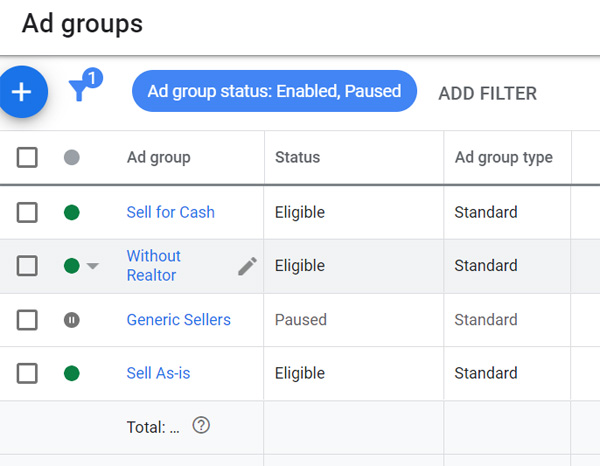
You can create campaigns based on different criteria such as location and service, but for a local real estate market such as a city or community, the best strategy is to create campaigns based on your target audience – Buyers, Sellers, and Investors.
Within those campaigns, make sure to create different ad groups for specific types of services for your target audience.
For example:
Campaign: Home buyers
Ad group 1: First-time buyers
Ad group 2: Investor buyers
Ad group 3: luxury real estate buyers
Choose your keywords for each ad group wisely. For example, if you target luxury real estate buyers with keywords that are suited for first-time home buyers, your conversion rate will greatly suffer.
Landing page optimization
When the leads click on your ads, they would be directed to a page on your website where they will take your desired action such as filling out a form.
Make sure you set up different a dedicated landing page for each campaign.
Don’t offer free home valuation on a page that also features listings for buyers. What it means is that you should have different landing pages for buyers and sellers. If you are launching different campaigns (not ad groups) for first-time home buyers, investor buyers, and luxury real estate buyers, you should ideally have a dedicated landing page for each of these audience segments.
Here are some good practices to follow:
- Don’t use your homepage as landing page.
- It must have a clear call-to-action (CTA). Make it clear what you want the visitor to do.
- It shouldn’t have anything that distracts the visitors such as unnecessary navigation.
- The headlines and copy of the landing page should match with the headline and description of the ad.
- Add social proof (such as testimonials).
- Don’t provide too much information or add complexity.
- Provide value. Landing pages saying ‘Contact Us’ usually doesn’t work that well.
Read more: Easy Guide to Real Estate Landing Page for Google PPC Ads (Examples)
Determine your budget
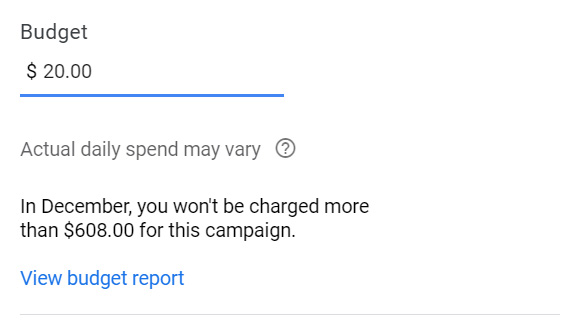
hile historically, the average CPC (cost-per-click) for real estate campaigns is $1.5-$2.5 in the USA, it will largely depend on the competition for keywords in your market.
You should aim to get a lead for $10-$35. A lead means someone who completed the desired action such as filling out a home valuation request form.
Based on the median sale price in your target communities, you can determine how much you are willing to spend for a lead.
Let’s say, for example, homes in your target neighborhood sell for $1M. You make $20,000-$25,000 from each deal. So, for your campaign to be profitable, you are willing to spend $5,000 – $10,000 for a conversion.
So, if you get one conversion out of 100 leads from spending $2500 – $3500 ($25-$35 per lead), your campaign is profitable.
Keyword research & keyword match types
Research keywords for each ad group in your campaign.
The keywords should be relevant to the audience you are targeting at the ad group level. For example, ‘First time home buyer grant’ is a keyword that is relevant to first-time home buyers, not necessarily to someone looking to invest in real estate.
Use Google’s keyword planner tool to find keywords.
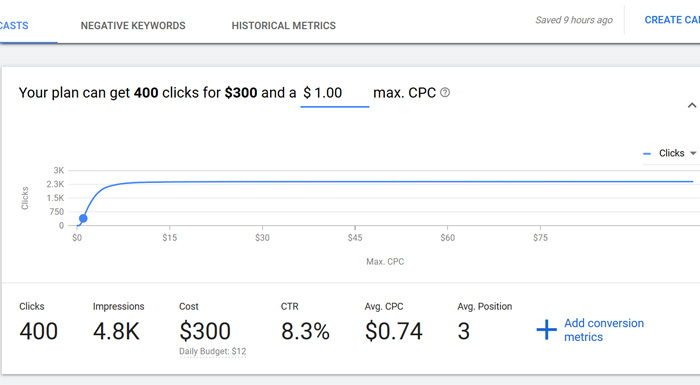
Next, determine keyword match types.
There are four options when it comes to keyword match types:
- Broad Match
- Phrase Match
- Exact Match
- Negative Match
If you are on a budget and the traffic volume for your target keywords is high, you should consider sticking to Phrase Match. If you want to discover new keywords, then you should use a combination of Broad Match and Phrase Match.
I have seen that Broad Match sometimes brings in irrelevant clicks. For example, you will get clicks from searches such as ‘home for sale in (city or neighborhood nae)’ if you are targeting ‘Sell My Home’ keyword with Broad Match type. The search term is used by buyers, while the keyword is intended for sellers. In this case, you will get irrelevant clicks.
Never forget to keep adding negative keywords if you are getting clicks from irrelevant searches.
Read also: The Ultimate List of Real Estate Keywords for PPC and SEO
Bidding strategy
While you should use maximize conversions bidding strategy, you should optimize the ads for clicks rather than conversions. This will lower your cost-per-click (CPC).
Your bidding strategy will depend on the types of keywords you are targeting and search intent.
Ad copy
You should write three headlines and three descriptions for each ad group. There should be at least three ad groups in each campaign.
The headlines and descriptions should match with the keywords you are targeting and the headlines and copy of the landing page.
This will improve the ad rank of your ads. Your ads will show at a higher position even if the bid is the same or even lower than the ads of your competitors.
Track
Once you launch your campaign, it’s important that you track the activities of the visitors – what they do after landing on your website. Are they clicking away? Then, you need to optimize your landing page.
You can connect your Google Ads account with Google Analytics to track the visitor activity.
Must-have elements of a Google Ad campaign for real estate agents
Here are the eight most important things you need to familiarize yourself with before dabbling in Google AdWords PPC for generating real estate leads:
Get your keywords right
There is no doubt in my mind about the fact that the success of your campaign will largely depend on how effectively you target the right keywords. Your keyword strategy will determine whether or not your ads are shown to the right audience.
There are two aspects of keyword strategy for Google Ads:
- Find the right keywords for each campaign or ad group in your account
- Get your keyword match type right
I recently wrote a detailed guide on how to research keywords for your PPC campaigns. Be sure to check it out because it explains what keyword match types are, how to find the right keywords and how to determine the keyword match type depending on your ad objective. This guide will explain how to use Google’s free Keyword Planner tool to find keywords and then get an estimate how many clicks you get for these keywords in your budget.
I will explain in brief here how keyword match type works.
Let’s understand the basic difference among the three types with an example.
Let’s assume you are targeting a keyword: buy homes in Kansas.
If you choose broad match keyword in your ad campaign, then the ad will show even if people use words or phrases in addition to your keywords like ‘cheap homes to buy in Wichita Kansas’, ‘how to buy homes in Kansas’, ‘what is the best time to buy a home in Overland Park in Kansas’ etc.
If you choose phrase match keywords, your ad will show only if people use the keywords in the exact order. For example, if a person searches for ‘cheap homes to buy in Wichita Kansas’, your ad won’t show because the keywords are not in the exact order. However, it will show if the person uses the keywords ‘cheap homes to buy in Kansas’.
Exact match keywords are exactly what they imply. Your ad will show only if a person enters the exact keywords: ‘buy homes in Kansas’.
‘Broad match’ keywords are good for driving traffic and brand awareness, so you will want to use ‘phrase match’ for generating high converting leads. You can also go with ‘exact keyword match type’, but if you are a real estate agent in a small geographical area, this may not be the best strategy because the search volume for your target keywords may be quite low.
Which one of these keyword match types an advertiser should target depends on the niche, ad objective and budget. If you are selling products with a mass appeal in a niche like eCommerce, you can definitely go for broad match keywords.
But since you are targeting highly-motivated property buyers and sellers, the safer bet is to use ‘phrase match’ – particularly if you have a small budget. You can consider using exact match keyword type if the search volume for target keywords in your area is high.
If you are not sure about the right keyword match type, you can always A/B test and determine which one provides you the highest conversion rate or Click-Through-Rate (CTR). For finding new keyword ideas, you should go with Broad Match keyword match type.
Realize your campaign’s full potential with Ad Extensions
I recently wrote a detailed guide on how to use Ad Extensions for real estate ads. You can check out this guide to learn more about Ad Extensions, but let’s discuss them in brief here.
Ad Extensions are basically links and additional information such as phone number, location or your officers in an advert in addition to the main headline, sub-headline.
There are enough studies to prove that Ad Extensions can increase click-through rate (CTR) substantially because they give you more ‘real estate’ in search results and provide searchers with more specific information.
For example, if the headline of your ad copy says ‘NYC properties for sale’, you can put links and additional information below the advert such as the location of your agency, the latest offers, more information about your services, your phone number, or a link to install your agency’s mobile app.
If you are using sitelink ad extension, Google may show the link to other relevant pages on your website – ‘Manhattan Properties, Available Coops, Brooklyn Properties, Available Condos’ etc.
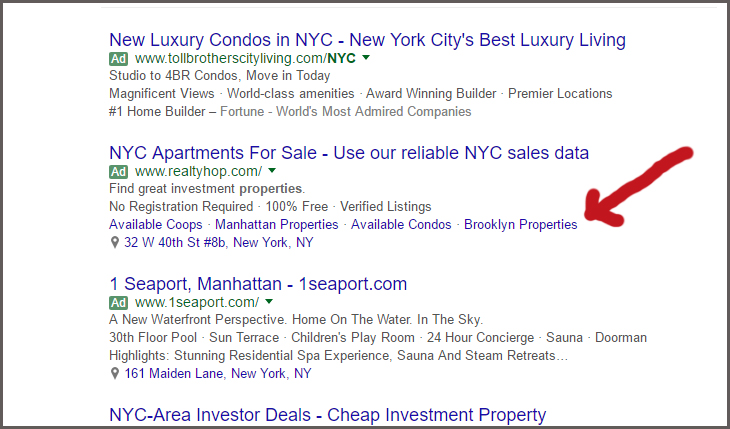
So if someone is looking for information about properties in a specific neighborhood or area in New York City, he or she can click the sitelink to that page (for example Brooklyn properties) and directly visit that page.
What it means that this ad extension makes it easier for people to find the specific information they are looking. But if he happens to be interested in properties particularly in Manhattan, your ad will immediately grab his attention.
Consider using brand name in headline
This strategy is suitable if you have a decent Google Ads budget.
Apart from adding your target keywords, you should also consider including your real estate agency’s brand name in the headline.
Ideally, you should write at least three ads for each ad group in your Google Ads campaign. You can include the brand name in at least one of them.
Studies indicate that many people skip ads appearing on top of search results. They will click organic results. If your agency’s brand name is in the headline, you will get free brand exposure even if your ad is not clicked.
The reason is that even if a user skips the ad, he or she may notice the brand name. When exposed to your brand multiple times (if you are using a retargeting campaign), the user will subconsciously remember it. It means that you get brand promotion completely free of cost.
What’s your return on investment?
When you start a real estate advertising campaign with Google AdWords, make sure you keep track of the conversion rate.
The best thing about advertising with Google Ads PPC is that you can measure everything. Some of the measurable results include (but are not limited to):
- How many people who saw your ad clicked it (click-through-rate aka CTR)
- How much you paid for each click (cost-per-click aka CPC)
- How many people took the desired action – for example, downloaded the eBook or shared their contact details in exchange for free access to listings in their neighborhood (conversion rate)
- How much each conversion cost you (cost-per-action aka CPA)
- The return on your ad spend
In order to achieve your CTR, CPC, or CPA targets, you have at your disposal some great Google Ads features:
- You can determine the maximum amount of money you are willing to pay for each click (Max CPC).
- You can tell Google the maximum amount you are willing to pay for each conversion.
This makes Google Ads a great tool to generate leads in your budget – regardless of how small or big your budget is.
For example, you can start your campaign with a budget of just $10 per day, test things out and then scale up your campaign when you start converting leads into clients.
It’s quite easy to determine your results from an ad campaign.
For example, let’s say you spent $2000 on Google Ads in a month for generating real estate leads. You got a total of 1000 clicks. This campaign generated 100 leads. The action you want to take your leads is to download an eBook, then the number of leads will be the number of people who downloaded the eBook.
One of these leads actually converted into a customer. You made $4000 after splitting the commission with the other agent and your broker. So, you made $2,000 from this particular ad campaign.
Now you need to determine ‘cost-per-click’ (CPC) and ‘cost per action’ (CPA).
- The CPC in this case is $2 (you got 1000 clicks from spending $2000).
- Your CPA (cost per action or conversion) is $20 (you collected 100 leads from $2000).
- Your revenue on ad spend is $2000 (you spent $2000 and made $4000).
It’s not bad, but now you need to focus on decreasing the CPC and CPA.
That’s where strategies such as manual bidding strategy, ad copy optimization, landing page optimization, and quality score optimization come in. This may
If you are not sure how to do all this, you can hire a real estate PPC expert.
It will have a great deal of impact on the profitability of your campaign. Just imagine what difference it will make if you can reduce the cost per click, and get more leads from the same budget. You can run your ads at scale.
Know what words or phrases to exclude (Negative Keywords)
A great feature of Google ads or most other PPC advertising platforms is that you can prevent your ads from showing up in search results if people use certain phrases or words in addition to your target keywords. These words or phrases are called Negative Keywords.
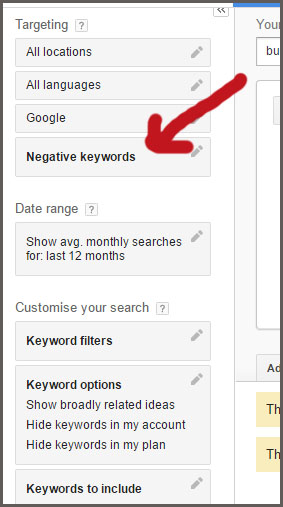
Adding Negative Keywords is necessary particularly if you are using ‘broad match’ keywords.
For example, a real estate broker from New Orleans told me recently that he was getting a lot of traffic for ‘Sell homes in New Orleans’, but that traffic was not converting into leads.
It turned out that lots of people were searching for ‘Brat Pitt Sells New Orleans home’ and clicked on his ad, just for the sack of it.
By adding Brat Pitt as Negative Keywords, he prevented these useless clicks.
When I last checked this keyword, there was only one ad showing up in the search results, and it was from Brat Pitt himself.

As per the company’s website, “Make It Right builds homes, founded by Brad Pitt in 2007, buildings and communities for people in need. All Make It Right projects are LEED Platinum certified and Cradle to Cradle inspired – meeting the highest standards of green building”.
I recently wrote a detailed guide on real estate Negative Keywords. Be sure to check it out if you want to avoid wasting money on Google Ads.
Are you leveraging Branded Keywords?
Now let’s talk about a Google ads strategy that will not only reduce your advertising costs tremendously but also skyrocket the conversion rate. This strategy will also prevent competitors from stealing your clients or leads.
Many real estate agencies don’t know how many people are searching for their brand in Google. If you are ignorant about it, your competitor will use it as an advantage and try to steal leads from you. Take a look at the screenshot below:
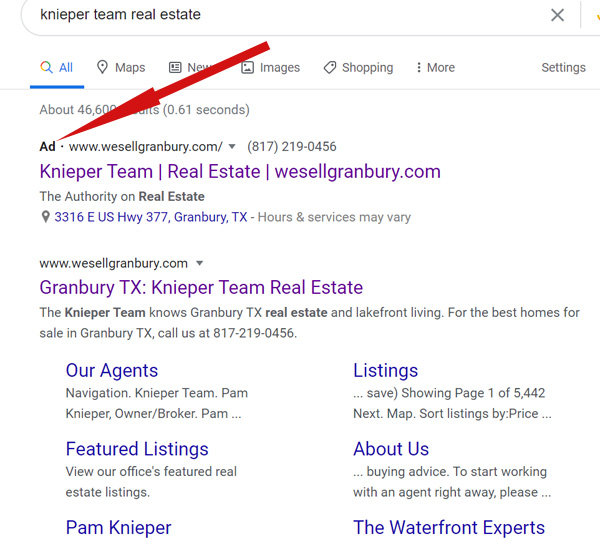
This real estate agency is bidding on its own brand name. The reason is that a lot of people search for them in Google by their brand name because they are a well-known agency in their area. Now let’s say you are a competitor. You can bid on this agency’s brand name and get clicks whenever a prospective client searches for them.
It makes it important for you to bid on your own brand, a tactic that is largely ignored by small and mid-sized brokerages.
Besides, you should bid on other brands if your prospects actively search for them online.
For example, you can run ads for keywords such as Zillow and Trulia because a lot of home buyers and sellers frequently use the names of these brands while looking for information related to buying and selling homes.
And you won’t believe it if I tell you that you can get away with paying less than $0.25 per click, simply because the competition is usually low.
If you are a real estate professional in Kansas, you can target keywords like ‘Zillow Kansas’ or ‘Trulia Kansas’ in order to make your ads show up when people type these words into Google Search. However, refrain from using the name of these brands in your ad copy.
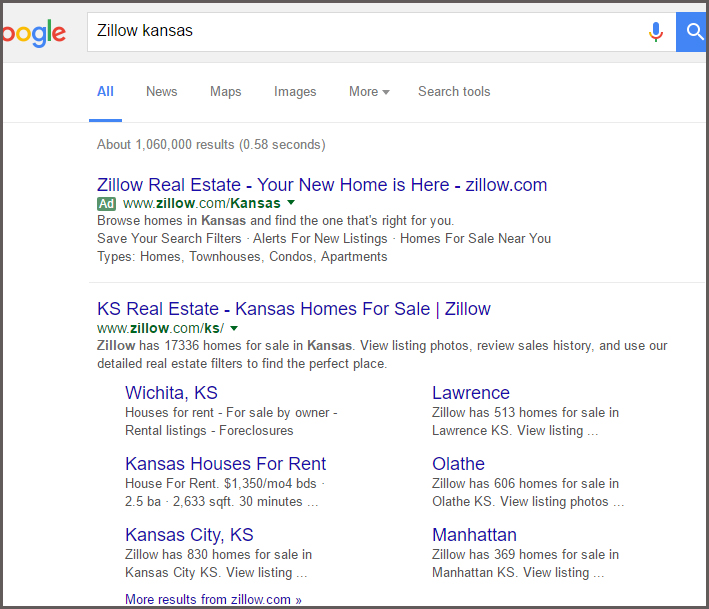
No#1 may not necessarily be the best position
Google Ads is a type of PPC (pay-per-click) advertising. In a recent article, I discussed what PPC means in real state and how bidding words in PPC campaigns.
You probably already know that you bid on keywords when you advertising on Google Ads. How much you will pay for each click depends on the competition for the keyword you are targeting. However, you can tell Google the maximum amount of money you are willing to pay for a click regardless of the competition. Your bid amount is one of the factors that determines your ad’s position in search engine results. So for example, if five advertisers are bidding for ‘homes for sale in California’ and if your bid is the highest, your ad will likely appear on the top.
You may be tempted to continuously increase your bid amounts to show your ad above your competitors and get the coveted Number#1 position, but several studies suggest that it may not be the best strategy.
It not only increases the advertising cost substantially but also leads to an increase in low converting traffic.
So keep changing your ad’s position by adjusting your bid amount. Then find out which ad position leads to a higher conversion rate.
You may see a reduction in traffic, but you can probably increase your CTR and conversion rate while reducing the costs at the same time.
Pay attention to Google’s new policy for housing-related ads
Google has put some restrictions on housing-related ads. Make sure that you are compliant and follow the latest Google Ads guidelines which prohibit real estate agents, lenders, and investors in the U.S. and Canada from using certain targeting options such as zip code and demographics.
In a recent article, I discussed what the new Google Ads policy for housing-related ads is and how it can impact your ad campaigns. Read the full article here:
Google Ads Restrictions on Real Estate PPC Campaigns: Complete Guide
Does Google AdWords work for real estate?
Google Adwords works for real estate because you can run an advertising campaign on any budget. It means that it doesn’t matter whether you are a big real estate agency or a small one, you can run a profitable ad campaign because you can determine your max CPC or the maximum amount you are willing to pay for each conversion.
Google Ads won’t work if you don’t know how to optimize your ad campaigns and leverage features such as the best bidding strategy depending on your goals, Max CPC, and Max CPA
From choosing the right keywords to optimizing the copy of your ads, you need to get yourself familiarize with the platform.
Further reading:
Real Estate YouTube Ads 101: ‘From Beginner to Advanced’ Guide
Killer Google PPC Ads for Real Estate Investors in 11 Easy Steps
Definitive Guide to Lowering Real Estate PPC Cost in 2022
Definitive Guide to Researching Real Estate PPC Keywords
Ultimate Guide to Real Estate Google Ads Extensions [Examples]
Guide to Negative Keywords List for Real Estate Google Ads


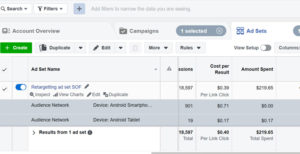
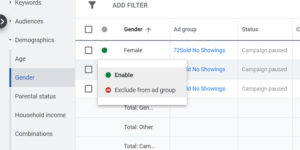
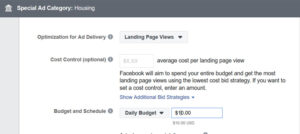
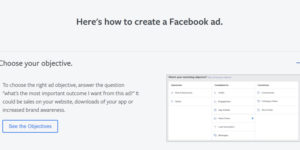
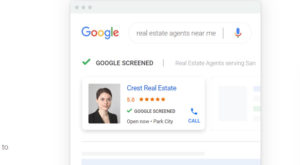
Hi,
really interesting post. I am an Italian realtor located in the city of Bologna and i can say that the hardest match here is to find new listings.
I am sure that GAdwords and a good copy for ads can do a lot to help. The point is to learn the correct strategies. Thanks for sharing these tips. Regards.
Hi
Thanks for your valuableinformation. I am running a Google ads campaign for one of real estate agency but not getting conversation.
Hi brother . Can i get a email or Whatsapp number of yours …..
You can reach me via email: [email protected]
Hi,
Thanks for sharing valuable info for running Google Ads for Real Estate Agent.
I have a question, can you suggest which bid strategy is more suitable for getting more conversion and less CPC.
Thanks in advance
Rishi Kumar